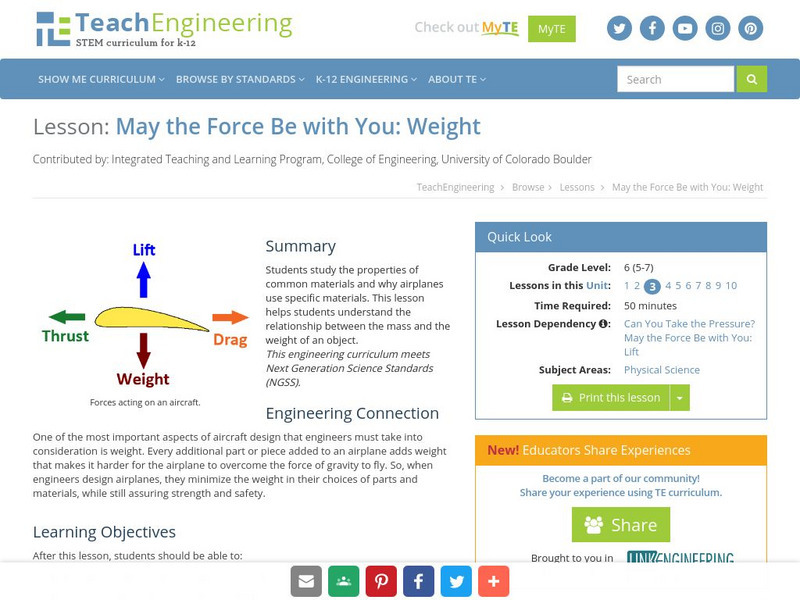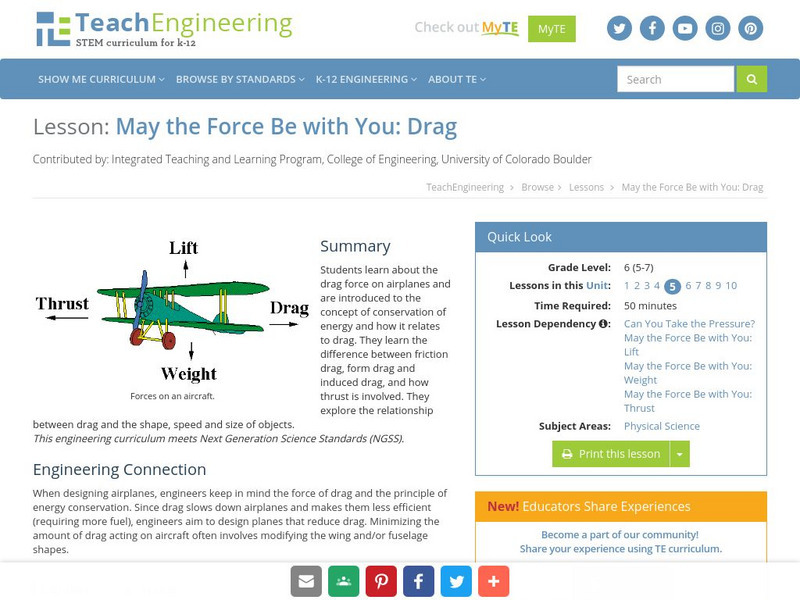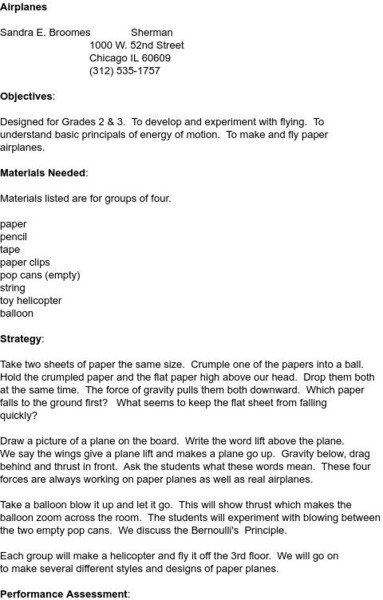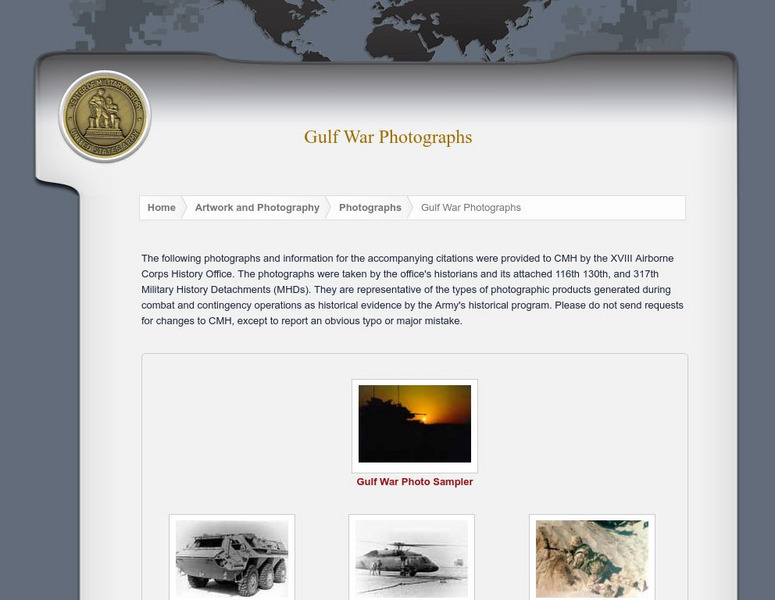TeachEngineering
Teach Engineering: May the Force Be With You: Weight
The purpose of this lesson is to help students understand the relationship between the mass and the weight of an object. Students will study the properties of common materials and why airplanes use specific materials.
TeachEngineering
Teach Engineering: May the Force Be With You: Drag
This lesson plan explores the drag force on airplanes. The students will be introduced to the concept of conservation of energy and how it relates to drag. Students will explore the relationship between drag and the shape, speed and size...
Science and Mathematics Initiative for Learning Enhancement (SMILE)
Smile: Lab Activity: Aviation
This site from the Illinois Institute of Technology provides a student lab activity in which the flight of a paper airplane is investigated and studied. Designed for primary grades, but easily adaptable for junior high young scholars.
TeachEngineering
Teach Engineering: What Makes Airplanes Fly?
Students begin to explore the idea of a force. To further their understanding of drag, gravity and weight, they conduct activities that model the behavior of parachutes and helicopters. An associated literacy activity engages the class...
TeachEngineering
Teach Engineering: What Is Newton's Third Law?
Students are introduced to Newton's third law of motion, and then learn that engineers apply Newton's third law and an understanding of reaction forces when designing a wide range of creations, from rockets and aircraft to door knobs,...
Other
Ontario Council for Technology Education: Transportation Design and Construction [Pdf]
In this project, students will develop knowledge and skills related to the construction of vehicle/craft systems. They will identify and describe the major systems and components of vehicles, aircraft, and/or watercraft such as body,...
Science and Mathematics Initiative for Learning Enhancement (SMILE)
Smile: Airplanes (2 3)
This paper airplane lesson plan helps students learn about certain concepts like air resistance, motion, and aerodynamics.
Smithsonian Institution
National Air and Space Museum: Wright Brothers: Embracing the Impossible [Pdf]
In this lesson, students explore primary resources to see what people who lived in the early age of flight felt about this innovation. They then compare that response to that towards an invention of today.
Center for Innovation in Engineering and Science Education, Stevens Institute of Technology
Ciese Navigational Vectors
For this project, students use real time data to learn how pilots navigate when they fly. Students go through a series of lessons on vectors, weather maps and flight tracking, then take a pilot's test where they apply what they have...
C-SPAN
C Span Classroom: Lesson Plan: Examples of Regulatory Agencies
In this activity, students learn about the costs and benefits of regulations and regulatory agencies. It includes nine video clips.
TryEngineering
Try Engineering: Engineered Sports
Students work in teams to investigate how aerospace engineering relates to sports, especially golf ball design and the physics of bounce. They use this information to determine whether these aerospace principles can be applied to...
Council for Economic Education
Econ Ed Link: Transportation: They Say We Had a Revolution (Part 1)
Advancements in transportation have played a key role in the growth of our nation. U.S.government policies have also had a considerable impact on the development of transport as we know it today. In this series of three lessons, the...
Discovery Education
Discovery Education: Inventors and Inventions 2: Air and Space
After discussing important flying inventions, students explore technological design by making paper airplanes.
Council for Economic Education
Econ Ed Link: Transportation: They Say We Had a Revolution (Part 3)
Advancements in transportation have played a key role in the growth of our nation. U.S. government policies have also had a considerable impact on the development of transport as we know it today. For this series of three lessons, the...
Alabama Learning Exchange
Alex: Let's Calculate Flight!
Young scholars will use stop watches to help understand elapsed time when they fly paper airplanes through the air. Students will then move on to using clocks. Young scholars will work out elapsed time word problems using made up flight...
Alabama Learning Exchange
Alex: Building a Paper Airplane Using Bernoulli's Principle
This is a culmination activity used after middle schoolers have studied Bernoulli's Principle as part of a unit on forces and fluids. Students will use the Internet, textbooks, library resources and their cooperative learning group to...
US Army Center
U.s. Army Center of Military History: Gulf War Photographs
A collection of photographs taken during the Gulf War by the XVIII Airborne Corps History Office. They are representative of the types of photographic products generated during combat and contingency operations as historical evidence by...
PBS
Pbs Learning Media: Amelia Earhart: Aviator, Record Breaker, and Activist
Through two primary source activities and a short video, students will learn about Earhart's passion for flying and determination to succeed as a female aviator.
Smithsonian Institution
Smithsonian Learning Lab: Stories of the Wrights' Flights
This lesson plan has students read primary materials from the Smithsonian collection written by the Wright brothers, and compare and contrast them to secondary sources, such as newspaper stories from the next day. There is background...
PBS
Bombers of World War Ii: Last Flight of Bomber 31
Website that chronicles the story of the search for remains of Bomber 31 that went down in Kamchatka during World War II. There is also a slide show and descriptions of several World War II bombers.
Other
Uss Alabama Battleship Memorial Park: Military Equipment
Explore the military equipment located throughout the USS Alabama Battleship Memorial Park.
PBS
Pbs Teachers: Scientific American: Flying Free: Winging It
Explore flight and the science behind lift and wing shape by creating two paper airplanes - a monoplane glider and a ring-wing glider.
TeachEngineering
Teach Engineering: Can You Take the Pressure?
This instructional activity introduces students to the concept of air pressure. Students will explore how air pressure creates force on an object. They will study the relationship between air pressure and the velocity of moving air.
TeachEngineering
Teach Engineering: May the Force Be With You: Thrust
In this instructional activity, students will study how propellers and jet turbines generate thrust. This instructional activity focuses on Isaac Newton's 3rd Law of Motion, which states that for every action there is an equal and...
Other popular searches
- Aviation and Aerospace
- Aviation History
- Aviation Topics
- Aviation Powerpoint
- Applied Math for Aviation
- Careers in Aviation
- Aviation Lesson Plans
- History of Aviation
- Flight, Aviation
- Aviation Classroom Projects
- Aviation Industry
- Aviation Pioneers





![Ontario Council for Technology Education: Transportation Design and Construction [Pdf] Lesson Plan Ontario Council for Technology Education: Transportation Design and Construction [Pdf] Lesson Plan](https://static.lp.lexp.cloud/images/attachment_defaults/resource/large/FPO-knovation.png)









